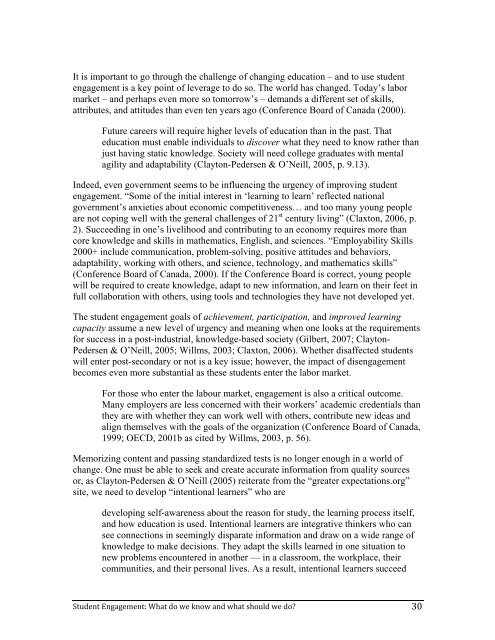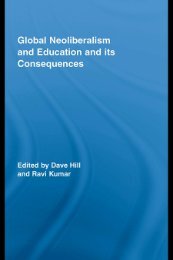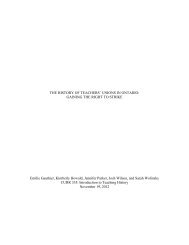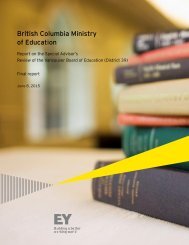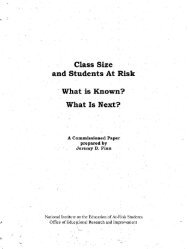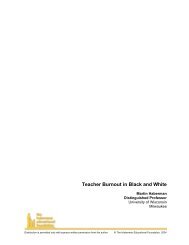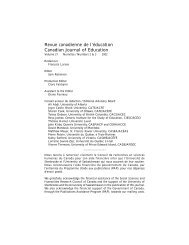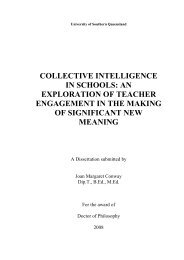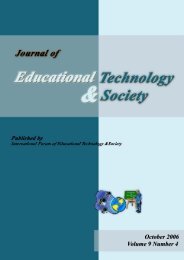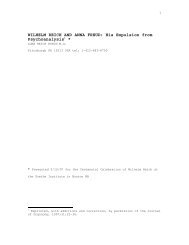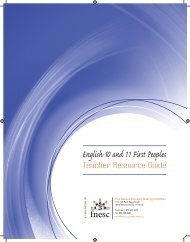Student Engagement: What do we know and what should we do?
Student Engagement: What do we know and what should we do?
Student Engagement: What do we know and what should we do?
Create successful ePaper yourself
Turn your PDF publications into a flip-book with our unique Google optimized e-Paper software.
It is important to go through the challenge of changing education – <strong>and</strong> to use student<br />
engagement is a key point of leverage to <strong>do</strong> so. The world has changed. Today’s labor<br />
market – <strong>and</strong> perhaps even more so tomorrow’s – dem<strong>and</strong>s a different set of skills,<br />
attributes, <strong>and</strong> attitudes than even ten years ago (Conference Board of Canada (2000).<br />
Future careers will require higher levels of education than in the past. That<br />
education must enable individuals to discover <strong>what</strong> they need to <strong>know</strong> rather than<br />
just having static <strong>know</strong>ledge. Society will need college graduates with mental<br />
agility <strong>and</strong> adaptability (Clayton-Pedersen & O’Neill, 2005, p. 9.13).<br />
Indeed, even government seems to be influencing the urgency of improving student<br />
engagement. “Some of the initial interest in ‘learning to learn’ reflected national<br />
government’s anxieties about economic competitiveness… <strong>and</strong> too many young people<br />
are not coping <strong>we</strong>ll with the general challenges of 21 st century living” (Claxton, 2006, p.<br />
2). Succeeding in one’s livelihood <strong>and</strong> contributing to an economy requires more than<br />
core <strong>know</strong>ledge <strong>and</strong> skills in mathematics, English, <strong>and</strong> sciences. “Employability Skills<br />
2000+ include communication, problem-solving, positive attitudes <strong>and</strong> behaviors,<br />
adaptability, working with others, <strong>and</strong> science, technology, <strong>and</strong> mathematics skills”<br />
(Conference Board of Canada, 2000). If the Conference Board is correct, young people<br />
will be required to create <strong>know</strong>ledge, adapt to new information, <strong>and</strong> learn on their feet in<br />
full collaboration with others, using tools <strong>and</strong> technologies they have not developed yet.<br />
The student engagement goals of achievement, participation, <strong>and</strong> improved learning<br />
capacity assume a new level of urgency <strong>and</strong> meaning when one looks at the requirements<br />
for success in a post-industrial, <strong>know</strong>ledge-based society (Gilbert, 2007; Clayton-<br />
Pedersen & O’Neill, 2005; Willms, 2003; Claxton, 2006). Whether disaffected students<br />
will enter post-secondary or not is a key issue; ho<strong>we</strong>ver, the impact of disengagement<br />
becomes even more substantial as these students enter the labor market.<br />
For those who enter the labour market, engagement is also a critical outcome.<br />
Many employers are less concerned with their workers’ academic credentials than<br />
they are with whether they can work <strong>we</strong>ll with others, contribute new ideas <strong>and</strong><br />
align themselves with the goals of the organization (Conference Board of Canada,<br />
1999; OECD, 2001b as cited by Willms, 2003, p. 56).<br />
Memorizing content <strong>and</strong> passing st<strong>and</strong>ardized tests is no longer enough in a world of<br />
change. One must be able to seek <strong>and</strong> create accurate information from quality sources<br />
or, as Clayton-Pedersen & O’Neill (2005) reiterate from the “greater expectations.org”<br />
site, <strong>we</strong> need to develop “intentional learners” who are<br />
developing self-awareness about the reason for study, the learning process itself,<br />
<strong>and</strong> how education is used. Intentional learners are integrative thinkers who can<br />
see connections in seemingly disparate information <strong>and</strong> draw on a wide range of<br />
<strong>know</strong>ledge to make decisions. They adapt the skills learned in one situation to<br />
new problems encountered in another — in a classroom, the workplace, their<br />
communities, <strong>and</strong> their personal lives. As a result, intentional learners succeed<br />
<strong>Student</strong> <strong>Engagement</strong>: <strong>What</strong> <strong>do</strong> <strong>we</strong> <strong>know</strong> <strong>and</strong> <strong>what</strong> <strong>should</strong> <strong>we</strong> <strong>do</strong>? 30


